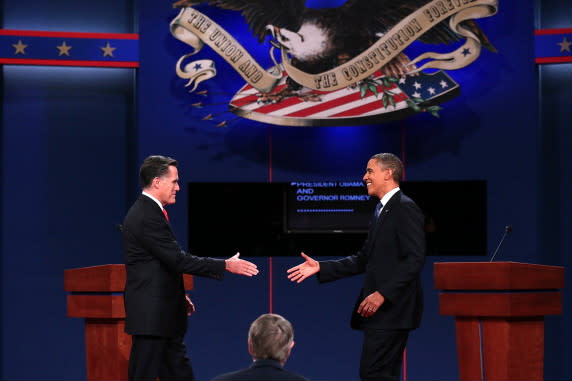 The Ticket
The Ticket13 things you may not know about the debates

The campaigns for both President Barack Obama and GOP challenger Mitt Romney signed an agreement before the start of the 2012 debates. It outlined their expectations and assorted ground rules for the three presidential contests and the lone vice presidential one. The 21-page "Memorandum of Understanding" was published by Time magazine's Mark Halperin on Monday on the heels of his report that both sides were wary of Candy Crowley's approach to moderating the debates. (Crowley later addressed those concerns.)
It includes things you might know from watching the debates and minutiae you might be surprised to learn.
Romney and Obama are not allowed to challenge each other to a debate outside of the four sanctioned by the commission:
The parties agree that they will not (1) issue any challenges for additional debates, (2) appear at any other debate or adversarial forum except as agreed to by the parties, or (3) accept any television or radio air time offers that involve a debate format or otherwise involve the simultaneous appearance of more than one candidate.
No props, cellphones or "tangible things" allowed:
No props, notes, charts, diagrams, or other writings or other tangible things may be brought into the debate by any candidate, including portable electronic devices.
No shout-outs:
No candidate may reference or cite any specific individual sitting in a debate audience (other than family members) at any time during a debate. If a candidate references or cites any specific individual(s) in a debate audience ... the moderator must interrupt and explain [it] violates the debate rules agreed to by that candidate.
No "Mitt," no "Barry"—and certainly no "friend":
Obama shall be addressed by the moderator as "Mr. President" or "President Obama." Romney shall be addressed by the moderator as "governor" or "Gov. Romney."
No "show of hands":
At no debate shall the moderator ask the candidates for a "show of hands" or similar calls for response.

No moving around up there (except during the town hall):
At no time during the October 3 first presidential debate shall either candidate move from his designated area behind his respective podium. At no time during the October 22 third presidential debate shall either candidate move from his designated area seated behind the table.
After a town hall voter asks a question, his or her mic is turned off:
The audience members shall not ask follow-up questions or otherwise participate in the extended discussion, and the audience member's microphone shall be turned off after he or she completes asking the questions.
Stage positioning is determined by a coin toss, just like in the NFL:
The commission will conduct a coin toss at least 72 hours before the October 3 (first presidential) debate. At that time, the winner of the coin toss shall have the option of choosing the stage position for the October 3 debate; the loser of the coin toss will have first choice of stage position for the October 22 (third presidential) debate.
No shots of the audience:
TV coverage during the question-and-answer period shall be limited to shots of the candidates or moderator, and in no case shall any television shots be taken of any member of the audience (including candidates' family members) from the time the first question is asked until the conclusion of the closing statements, if any.
No risers:
No candidate shall be permitted to use risers or any other device to create an impression of elevated height.
Chairs must be identical and footrests preapproved:
The chairs shall be identical and have backs and a footrest and shall be approved by the candidates' representatives.
No warming up the crowd:
Prior to the start of the debate, neither the moderator nor any other person shall engage in a "warm-up" session with the audience by engaging in a question-and-answer session or by delivering preliminary remarks.
The media—as usual—get the cheap seats:
Any member of the media seated in the auditorium shall be accommodated only in the last two rows of the auditorium farthest from the stage.

